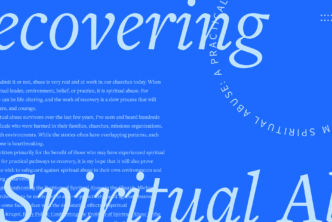Did you attend church on Sunday? If so, you’re part of an increasingly rare minority. In fact, fewer people regularly attend church now than at any time in American history.1 Why is this?
What follows is a testimony—a confession—of my five decades attending churches and how their liturgies affected me. I offer it as a window into what others might be experiencing and why so many might be leaving. I also offer it as a call for us to remember what’s most important.
Simply put, I define liturgy as the structure and focus of a worship service. Liturgy answers the questions, What happens, why, and in what order?2 Every church, even the most informal ones, have an expected order of service, a liturgy. Liturgy is more than just a way to get through everything in the service in an orderly fashion. In fact, it can make the difference between rote religion and gospel life.3
Liturgy as law
I went to church yesterday, as has been my habit for more than fifty years. Sunday? Church? Of course. From right before my twenty-first birthday until now, here in my seventy-third year of life—every Sunday: church.
But why have I gone to church for over fifty years?
Big “L” Law: duty
Yes, I have gone habitually, but that’s not to say I always went joyfully, in contentment, or even in faith in the good news. Mostly I went out of duty-driven fear: Sundays belonged to God, and he demanded my time and service. The command is plain: “Don’t stop meeting together with other believers, which some people have gotten into the habit of doing” (Heb 10:25 CEB). I went because I had “work” to accomplish. I went to “serve” God. It was my duty.
In some ways church attendance was like a talisman for me. If I gave God his due, then he was obligated to protect and provide for me. I feared what would happen if I didn’t attend. I was afraid that God would be mad and zap me if I didn’t go. I feared that my kids would be lost if they weren’t tethered to church.
Church attendance was like a talisman for me. If I gave God his due, then he was obligated to protect and provide for me.
That’s the way duty to the Law works: If I do my bit at church every week, God owes me blessings. If, on the other hand, I do not do my part, God might punish me. I was attending church to earn favor and avoid punishment. And for as hard as I was working, he certainly owed me! This “obedience = blessing” equation, though, is not good news.
Little “l” law: reputation repair
In addition to that big “L” Law (duty), I also attended church for another, more subjective reason: as reputation repair, trying to show myself and others that I had become a good person. I went because I had something to prove. I was desperate to know I was okay, that I was good. And I was desperate to reassure myself that others thought the same. I sought to bless myself by my labors.
If big “L” Law is duty- or wage-driven, little “l” law is self-approval-driven.
Two liturgies, the same song
I can now see, however, that my focus was all wrong.
“Learn this, do that”
At some churches I attended during this time, the liturgy focused on theological correctness. Did the structure and content of the worship service prove we knew God accurately and knew how to respond in what we said, sang, and prayed? Did the sermon prove we knew all the right things to believe? Was my mind informed? Did I fulfill my obligation to God’s law in my attendance? Additionally, these churches placed heavy emphasis on duty: “Because God is so great, you must _____!” This is big “L” Law: liturgy as duty.
I used this liturgy to assure myself that I had my theological ducks in a row. Many of its aspects put the focus on myself, my intellect, and my obligations. Its precision fed my pride, making me feel smarter—and therefore better—than both my former self and others. I enjoyed the self-approval (pride) I felt when I looked down on other Christians whose theology I thought was all wrong.
It is good, of course, to seek to know God rightly and to respond in grateful obedience. But this form of liturgy was primarily intellectual. I used its theological precision in my quest for reputation repair (little “l” law). I thought my intellectual prowess meant I was getting better, “progressing in my sanctification,” as we would say.
“Experience this, do that”
The liturgies of other churches I attended, though very different outwardly, effectively sang the same song: They too emphasized law. Their services focused on getting me excited about God. They would start with a peppy song (or four). They intended these songs to awaken my emotions to renew my sense of commitment for the coming week. Yes, the services gave some attention to learning about God, but the primary emphasis was on experiencing God and living for him. Sermons were frequently self-help messages like, how to have a good marriage; how to have good kids; how to [you fill in the blank]. Once again, the focus of the liturgy was on me and how I was progressing.
It is right, of course, to use our God-given emotions in worship. This church did that very well. Singing has personal and communal benefit.4 In addition, God is pleased with our song, and is present with us, “enthroned on the praises of Israel” (Ps 22:3). The Son even joins us in it (Heb 2:12)! It is good to be emotionally moved toward the Lord.
The problem with this kind of service, though, is that I still remained the focus. I judged my standing before God and my growth based on how emotionally influenced I was by the worship and sermon. Did I feel God’s presence? Was I moved to serve more? I used these experiences either to assure or condemn myself. This again is liturgy as law.
I didn’t need to work for anything because everything was already given.
In both cases, I worked and served incessantly, missing the reality that Jesus had already worked and served for me. He satisfied all the demands of the law and gave me a new, beautiful reputation: his. I didn’t need to work for anything because everything was already given.
Liturgy as the gospel
I am now learning to attend church for another entirely different reason. I attend, at least for those precious few hours, to get the attention off myself and onto Another, one who has already swallowed up all my slavery to self-serving merit-seeking and showered me with unearned forgiveness and approval. This is liturgy as gospel.
How might a gospel liturgy have silenced the demands of both big “L” and little “l” law for me? Because the New Testament “nowhere sets down a liturgy in the sense of prescribing forms of service for church worship”5, I believe leaders have some freedom as they construct God-honoring liturgies, e.g., when and how to sing, pray, assure, preach, commune, and bless. With one major caveat: The focal point of the church’s liturgy must be nothing less than Jesus. That means that each of its elements must somehow serve to direct the worshiper to the good news about the Lord (Luke 24:24–27, 44–47).
What might it look like?
Songs and hymns (Col 3:16)
Finding references to the person and work of Jesus in every song produces gratitude for him. Rather than songs that focus on me, Christ-centered songs would fill me with faith that everything had already been done.
Prayers (1 Tim 2:1–6)
Prayers would include our failures, needs, trust in God’s providential care, and submission to his will—all within the context of a holy God who sent his Son for sinners and so delights to hear our voice.
Assurance of pardon (Col 1:14)
This is the one aspect of a gospel liturgy that has been most absent in my experience. But now, hearing that pardon has truly been granted to me dismantles my duty-driven Law keeping and incessant pursuit of self-approval. Because I’ve been forgiven, I no longer need to pretend that I am anything other than what I am.
Because I’ve been forgiven, I no longer need to pretend that I am anything other than what I am.
Personally, I wonder how many people drag themselves to church hoping to hear a good word to give them courage to continue in the fight, only to walk away still burdened by their failures, still grieving, still self-condemned. I did for years.
Declaration and instruction in the gospel (Col 1:23)
If the sermon isn’t ultimately about Jesus, no matter what the passage it’s from, how can it be called Christian? Why not just listen to a helpful podcast or TED Talk? Please don’t tell me I need to be more like some Bible “hero.” I already know I don’t measure up. The Bible only has one hero. He is the one I need to hear about.
For example, my pastors are currently preaching through 1 Samuel. Every week, even as they preach on Samuel, Saul, or David, they always bring us back to Jesus, who alone is the true king we all need. It’s beautiful.6 Only the message of Jesus’s life, death, and resurrection frees me from myself and gives me hope (see Rom 10:17).
Communion (1 Cor 11:23–26)
Thankfully, I am now in a church that celebrates communion weekly. As the songs, prayers, assurances, and messages prepare my heart to receive Christ’s hospitality at the table, communion becomes the highlight of the service.
Communion is precious because it re-centers us on the one essential thing: the gospel.7 Four phrases stand out to me:
- “On the night he was betrayed.” He willingly condescended to be in relationship with people, making himself vulnerable to our sinful actions.
- “This is my body given for you.” He took on a body in the incarnation, and in that body obeyed all the Law on my behalf. His record of obedience is now mine. He allowed that body to suffer the curse of death for disobedience in my place.
- “This is my blood poured out for you.” His truly human blood was shed to pay for my sin and make me clean. Betrayal, body, blood—all for me.
- “Remember.” He’s here! Remember this all week, and imagine what that coming feast will be like!
The benediction (Num 6:24–26)
We hear another good word from the Lord who has served us so well. Because of Jesus’s work for us, we can know that we will be blessed and kept in the week to come. We can know that his face is shining on us with grace, that we have been granted peace with him, and now, because of that, with our neighbor.
The preeminent One
Every liturgy where Jesus’s name is not preeminent is nothing more than dead religion. It may be intellectual or emotional or some combination of both, but it is less than Christian and powerless to free me from myself.
Consider this seminal passage:
He [Jesus] is the head of the body, the church, who is the beginning, the one who is the firstborn from among the dead so that he might occupy the first place in everything.” (Col 1:18 CEB, emphasis added)
Certainly, that word “everything” must include liturgy. I am not the point of the liturgy. Jesus is. My attendance and work are not the point. I need to be reminded of his preeminence, that everything is “for him” (Col 1:16, emphasis added). The songs, the prayers, the preaching, the communing, the blessing is from him and for him!
He’s the only one who has the power to free me from the demands of the Law. He’s the only one that could bring me peace. And in these days of waning church attendance, peace is a blessed gift the church has on offer, a gift that the world cannot give.
Elyse Fitzpatrick’s recommendations on liturgy and the gospel
- Barbara Duguid, Extravagant Grace: God’s Glory Displayed in Our Weakness
- Tim Keller’s sermon archive at Gospel in Life
Desiring the Kingdom: Worship, Worldview, and Cultural Formation (Cultural Liturgies Series, Vol. 1)
Regular price: $22.99
The Gospel-Driven Life: Being Good News People in a Bad News World
Regular price: $16.99
The Unfolding Mystery, 25th Anniversary Edition: Discovering Christ in the Old Testament
Regular price: $12.99
Comforts from Romans: Celebrating the Gospel One Day at a Time (audio)
Regular price: $14.98
Related articles
- Life Together, Confession Together: Why Churches Need Corporate Confession
- What Is Absolution? Is It the Same as Forgiveness?
- Lent: A Season to Dread or to Cherish?
- Is Your Church Liturgy Political? Worship as Politics
- What’s the Holy Spirit’s Role in Worship? It’s Complicated
- “The State of Church Attendance: Trends and Statistics 2023,” ChurchTrac, accessed November 4, 2024, https://www.churchtrac.com/articles/the-state-of-church-attendance-trends-and-statistics-2023.
- In this article, I also make use of some other terms worth defining:
- While at times the word “law” is rightly used in other ways (for instance, see discussions about law–gospel), for this article, I use law to refer to my attempt to use rules, either God’s or my own, to earn merit in God’s, others’, or my own eyes.
- I define “gospel” as all the work Jesus did from his incarnation, sinless life, substitutionary death, resurrection, ascension, and ongoing reign for us and in our place.
- “Liturgy” as either of these things refers to my personal experience of that liturgy—whether it promotes my tendency towards law or whether in it I encounter the gospel.
- Rather than making a case for a particular liturgical form or sequence, I point you to some great books that have already done so: Bryan Chappell, Christ-Centered Worship: Letting the Gospel Shape Our Practice (Baker Academic, 2009); and James K. A. Smith, Desiring the Kingdom: Worship, Worldview, and Cultural Formation, vol. 1, Cultural Liturgies (Baker Academic, 2009).
- In fact, brain science shows that singing affects our emotions in positive ways. It triggers the “release of endorphins, oxytocin, dopamine and serotonin—hormones associated with feelings of pleasure, as well as trust and bonding.” Ed Decker, “Group Singing Provides a Good Refrain for the Brain,” International Arts + Mind Lab, accessed October 7, 2024, https://www.artsandmindlab.org/group-singing-provides-a-good-refrain-for-the-brain.
- Alan Cairns, Dictionary of Theological Terms (Ambassador Emerald International, 2002), 266.
- For some wonderful books on Christ-centered preaching, see Bryan Chappell’s Christ-Centered Preaching: Redeeming the Expository Sermon, 2nd ed. (Baker Academic, 2005), and Dennis Johnson’s Him We Proclaim: Preaching Christ from All the Scriptures (P&R, 2007).
- As James K. A. Smith writes, “While the whole world is a sacrament, we might say that the sacraments and the liturgy are unique ‘hot spots’ where God’s formative, illuminating presence is particularly ‘intense.’” Desiring the Kingdom: Worship, Worldview, and Cultural Formation, vol. 1, Cultural Liturgies (Baker Academic, 2009), 148–149.





